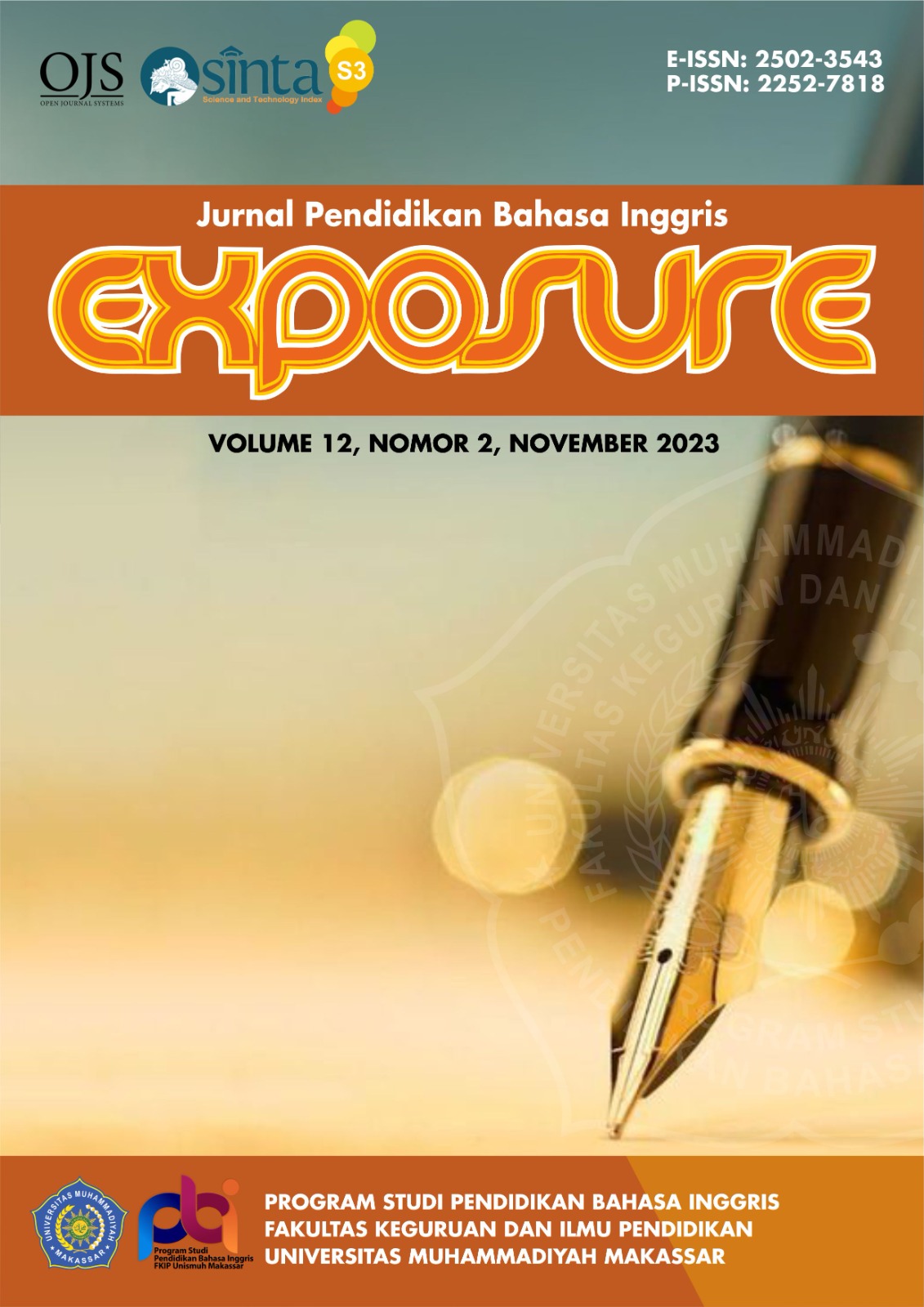BILINGUAL INSTRUCTIONS OF INDONESIAN PRIMARY SCHOOLS IN ENDENESE COMMUNITY
DOI:
https://doi.org/10.26618/exposure.v12i2.11884Keywords:
Bilingual, Transitional, Perception, Impact, Learning outcomesAbstract
This study aims at determining the first-grade teacher perception of primary school on the use of bilingual instructions and the impact on students’ learning outcomes. This qualitative study used the first-grade teacher who taught reading and writing in first year students at SDK Pu’ubheto, Ende Sub-district of Ende Regency. The data were collected through in-depth interview, observation and documentation. The interview document data were analyzed descriptively. The result showed that the teacher was successfully implementing bilingual instruction. Finally, the implementation of bilingualism by the teacher affected teacher-student interaction and improved students' reading and writing skill and learning outcomes..
References
Abduh, A. (2018). Lecturers’ perceptions on factors influencing the implementation of bilingual instruction in Indonesian universities. Journal of Applied Research in Higher Education.
Arka, I.W. 2004. Challenges and Prospect of Maintaining Rongga: an Ethnographic Report. Retrieved from
http://ses.library.usyd.edu.au/bitstream/2123/138/1/ALS-20050630-WA.pdf
Baker, C. (2006). Foundations of Bilingual Education and Bilingual. Bristol: Multilingual Matters.
Clegg, J. & Afitska, O. 2011. Teaching and learning in two languages in African classrooms. Comparative Education, Vol. 4, 61-77.
Creswell, J. W., & Creswell, J. D. (2018). Research design: Qualitative, quantitative, and mixed methods approaches (5th ed.). Thousand Oaks, CA: SAGE.
Cummins, J.1995. Biligual education and anti-racist education. In O, Garcia. & C, Baker (Eds.), Policy and Practice in Bilingual Education, (pp. 63 - 69). Clevedon: Multilingual Matters.
Cummins, J. (2000). Language, power, and pedagogy. Bilingual children in the crossfire. Clevedon, England: Multilingual Matters.
Denicolo, P. (2013). Achieving impact in research. Sage.
Dimyati dan Mudjiono (2006 hlm. 3-4) Belajar dan Pembelajaran. Jakarta: PT Rineka Cipta.
Dutcher, N. 2003. Promise and perils of mother tongue education. Center for Applied Linguistics, Washington DC, USA. pp. 1-8.
Fishman, J. A.1965. Who speaks what language to whom and when. La Linguistique. Vol. 1, 67-88.
Fishman, J. A., Lovas, J. 1970. Bilingual Education in Sociolinguistic Perspective. TESOL Quarterly, Vol. 4, 215-222.
Gupta, A.F. 1997. When mother-tongue education is not preferred. Journal of Multilingual and Multicultural Development, Vol. 18, 496-506
Kamwangamalu, N. 2010. Multilingualism and code switching in education. In N. Hornberger and S. L. McKay (Eds.), Sociolinguistics and language education. (pp. 116-142). Clevedon: Multilingual Matters.
Lee, Chaehyun. 2020. Functional of Translanguaging Performed by Korean-American Emergent Bilingual. International Journal of Elementary Education. Vol. 9, No. 3, 2020, pp. 50-59. doi: 10.11648/j.ijeedu.20200903.11
Maryanto. (2009). Regional and local languages as languages of oral instruction in Indonesia. In K. Kosonen, C, Young (Eds.), Mother Tongue as Bridge Language of Instruction: policies and experiences in Southeast Asia (pp. 69-75). Bangkok: The Southeast Asian Ministers of Education Organization (SEAMEO) Secretariat.
Nababan, P.W.J. 1991. Language in education: the case of Indonesia. International Review of Education. Vol. 37, 115-131.
Robbins, S. P. (2002). Organizational Behavior (10th Bk & Cr edition). Prentice Hall College Div.
Sama, Gratiana.,Ota, Maria, Kristina., Siami, Gregoriana, Apriliani. 2021. Student's Perception towards the Use Of Edmodo In Learning Effective Listening In The Pandemic Covid-19 Period. Exposure: Jurnal Pendidikan Bahasa Inggris. Volume 10 (1) May 2021, page 56-64.
DOI: https://doi.org/10.26618/exposure.v10i1.4940
Skutnabb-Kangas, T. 1995. Multilingualism and the education of minority children. In O, Garcia & C, Baker. (Eds.), Policy and Practice in Bilingual Education, (pp. 40- 62). Clevedon: Multilingual Matters.
Walgito, B. (2004). Pengantar Psikologi Umum. Yogyakarta: Andi.
Tracy, S. J. (2013). Qualitative Research Methods: Collecting evidence, crafting analysis, communicating impact. (1st Ed.). Chichester, England: John Wiley & Sons.
Downloads
Published
Issue
Section
License
Authors who publish with this journal agree to the following terms:
In order to assure the highest standards for published articles, a peer review policy is applied. In pursue of the compliance with academic standards, all parties involved in the publishing process (the authors, the editors and the editorial board and the reviewers) agree to meet the responsibilities stated below in accordance to the Journal publication ethics and malpractice statement.
Duties of Authors:
- The author(s) warrant that the submitted article is an original work, which has not been previously published, and that they have obtained an agreement from any co-author(s) prior to the manuscript’s submission;
- The author(s) should not submit articles describing essentially the same research to more than one journal;
- The authors(s) make certain that the manuscript meets the terms of the Manuscript Submission Guideline regarding appropriate academic citation and that no copyright infringement occurs;
- The authors(s) should inform the editors about any conflict of interests and report any errors they subsequently, discover in their manuscript.
Duties of Editors and the Editorial Board:
- The editors, together with the editorial board, are responsible for deciding upon the publication or rejection of the submitted manuscripts based only on their originality, significance, and relevance to the domains of the journal;
- The editors evaluate the manuscripts compliance with academic criteria, the domains of the journal and the guidelines;
- The editors must at all times respect the confidentiality of any information pertaining to the submitted manuscripts;
- The editors assign the review of each manuscript to two reviewers chosen according to their domains of expertise. The editors must take into account any conflict of interest reported by the authors and the reviewers.
- The editors must ensure that the comments and recommendations of the reviewers are sent to the author(s) in due time and that the manuscripts are returned to the editors, who take the final decision to publish them or not.
Authors are permitted and encouraged to post online a pre-publication manuscript (but not the Publisher’s final formatted PDF version of the Work) in institutional repositories or on their Websites prior to and during the submission process, as it can lead to productive exchanges, as well as earlier and greater citation of published work (see The Effect of Open Access). Any such posting made before acceptance and publication of the Work shall be updated upon publication to include a reference to the Publisher-assigned DOI (Digital Object Identifier) and a link to the online abstract for the final published Work in the Journal.

